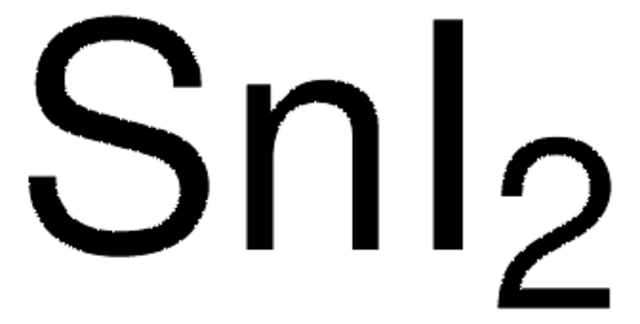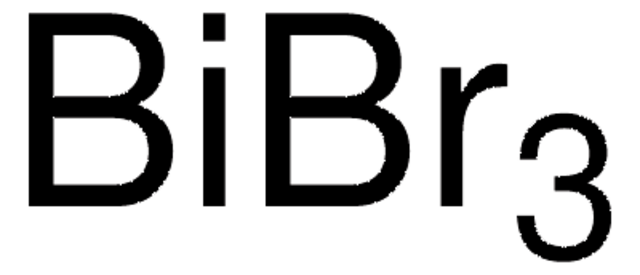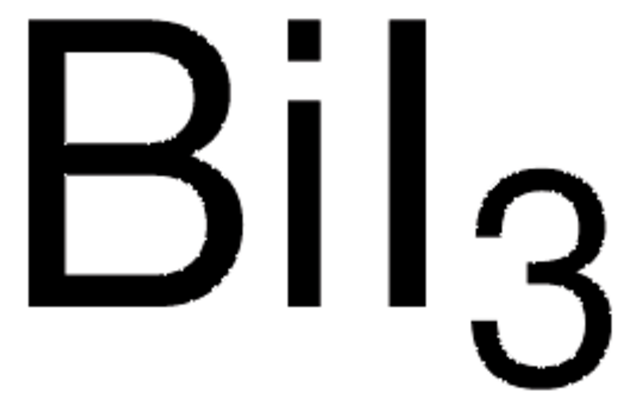554359
Lead(II) iodide
AnhydroBeads™, −10 mesh, 99.999% trace metals basis
Synonym(s):
Lead diiodide, Lead diiodide (PbI2), Lead iodide, Plumbous iodide
About This Item
Recommended Products
product line
AnhydroBeads™
Quality Level
Assay
99.999% trace metals basis
impurities
≤15.0 ppm Trace Metal Analysis
particle size
−10 mesh
bp
954 °C (lit.)
mp
402 °C (lit.)
density
6.16 g/mL at 25 °C (lit.)
SMILES string
I[PbH2]I
InChI
1S/2HI.Pb/h2*1H;/q;;+2/p-2
InChI key
RQQRAHKHDFPBMC-UHFFFAOYSA-L
Looking for similar products? Visit Product Comparison Guide
General description
Application
- Polycrystalline α-FAPbI3 thin films by solution processing method. These polycrystalline thin films are applicable as photodetectors.
- Organic/inorganic hybrid 2D perovskite materials, applicable in solar cells.
Legal Information
Not finding the right product?
Try our Product Selector Tool.
accessory
Signal Word
Danger
Hazard Statements
Precautionary Statements
Hazard Classifications
Acute Tox. 4 Inhalation - Acute Tox. 4 Oral - Aquatic Acute 1 - Aquatic Chronic 1 - Repr. 1A - STOT RE 2
Storage Class Code
6.1C - Combustible acute toxic Cat.3 / toxic compounds or compounds which causing chronic effects
WGK
WGK 3
Flash Point(F)
Not applicable
Flash Point(C)
Not applicable
Personal Protective Equipment
Choose from one of the most recent versions:
Already Own This Product?
Find documentation for the products that you have recently purchased in the Document Library.
Customers Also Viewed
Articles
Since the first report of the low-cost dye-sensitized solar cell (DSSC) in 1991 by Gratzel and his coworker,1 dye-sensitized solar cells (DSSC) has been regarded as one of the most promising photovoltaic technologies because of their transparent and colorful characteristics, as well as low cost.
Colloidal quantum dots (CQDs) are semiconducting crystals of only a few nanometers (ca. 2–12 nm) coated with ligand/surfactant molecules to help prevent agglomeration.
The past several decades have seen major advancements in the synthesis of metal nanomaterials. Most recently, controlled synthesis has become versatile enough to regulate the exact number of atoms and ligands of very small metal nanoparticles, referred to as “clusters”.
Next generation solar cells have the potential to achieve conversion efficiencies beyond the Shockley-Queisser (S-Q) limit while also significantly lowering production costs.
Our team of scientists has experience in all areas of research including Life Science, Material Science, Chemical Synthesis, Chromatography, Analytical and many others.
Contact Technical Service










![[6,6]-Phenyl C61 butyric acid methyl ester >99.9%](/deepweb/assets/sigmaaldrich/product/structures/359/221/d990c746-0960-4c69-bf76-fe09b193824d/640/d990c746-0960-4c69-bf76-fe09b193824d.png)

